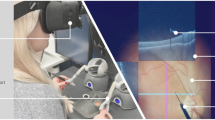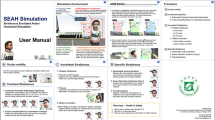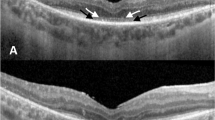Abstract
Purpose
To evaluate the variability of performance among novice ophthalmic trainees in a range of repeated tasks using the Eyesi virtual reality (VR) simulator.
Methods
Eighteen subjects undertook three attempts of five cataract specific and generic three-dimensional tasks: continuous curvilinear capsulorhexis, cracking and chopping, cataract navigation, bimanual cataract training, anti-tremor. Scores for each attempt were out of a maximum of 100 points. A non-parametric test was used to analyse the data, where a P-value of <0.05 was considered statistically significant.
Results
Highly significant differences were found between the scores achieved in the first attempt and that during the second (P<0.0001) and third (P<0.0001) but not between the second and third attempt (P=0.65). There was no significant variability in the overall score between the users (P=0.1104) or in the difference between their highest and lowest score (P=0.3878). Highly significant differences between tasks were shown both in the overall score (P=0.0001) and in the difference between highest and lowest score (P=0.003).
Conclusion
This study, which is the first to quantify reproducibility of performance in entry level trainees using a VR tool, demonstrated significant intra-novice variability. The cohort of subjects performed equally overall in the range of tasks (no inter-novice variability) but each showed that performance varies significantly with the complexity of the task when using this high-fidelity instrument.
Similar content being viewed by others
Log in or create a free account to read this content
Gain free access to this article, as well as selected content from this journal and more on nature.com
or
References
Aggarwal R, Black SA, Hance JR, Darzi A, Cheshire NJW . Virtual reality simulation training can improve inexperienced surgeons’ endovascular skills. Eur J Vasc Endovasc Surg 2006; 31 (6): 588–593.
Ikonen TS, Antikainen T, Silvennoinen M, Isojärvi J, Mäkinen E, Scheinin TM . Virtual reality simulator training of laparoscopic cholecystectomies—a systematic review. Scand J Surg 2012; 101 (1): 5–12.
Longridge T, Bürki-Cohen J, Go TH, Kendra AJ Simulator fidelity considerations for training and evaluation of today’s airline pilots. Proceedings of the 11th international symposium on aviation psychology (Internet). 2001 (cited November 28 2012). p 1–7. Available from https://www.hf.faa.gov/docs/508/docs/VolpeLongridge2001.pdf.
Ericsson KA, Prietula MJ, Cokely ET . The making of an expert. Harvard Business Review 2007; 85 (7/8): 114.
Saleh GM, Gauba V, Mitra A, Litwin AS, Chung AKK, Benjamin L . Objective structured assessment of cataract surgical skill. Arch. Ophthalmol. 2007; 125 (3): 363–366.
Saleh GM, Voyatzis G, Voyazis Y, Hance J, Ratnasothy J, Darzi A . Evaluating surgical dexterity during corneal suturing. Arch Ophthalmol 2006; 124 (9): 1263–1266.
Gauba V, Saleh GM, Goel S . Ophthalmic plastic surgical skills assessment tool. Ophthal Plast Reconstr Surg 2008; 24 (1): 43–46.
Saleh GM, Lindfield D, Sim D, Tsesmetzoglou E, Gauba V, Gartry DS et al. Kinematic analysis of surgical dexterity in intraocular surgery. Arch Ophthalmol 2009; 127 (6): 758–762.
Saleh GM, Gauba V, Sim D, Lindfield D, Borhani M, Ghoussayni S . Motion analysis as a tool for the evaluation of oculoplastic surgical skill: evaluation of oculoplastic surgical skill. Arch Ophthalmol 2008; 126 (2): 213–216.
Solverson DJ, Mazzoli RA, Raymond WR, Nelson ML, Hansen EA, Torres MF et al. Virtual reality simulation in acquiring and differentiating basic ophthalmic microsurgical skills. Simul Healthc 2009; 4 (2): 98–103.
Gauba V, Tsangaris P, Tossounis C, Mitra A, McLean C, Saleh GM . Human reliability analysis of cataract surgery. Arch Ophthalmol 2008; 126 (2): 173–177.
Mahr MA, Hodge DO . Construct validity of anterior segment anti-tremor and forceps surgical simulator training modules: attending versus resident surgeon performance. J Cataract Refract Surg 2008; 34 (6): 980–985.
Privett B, Greenlee E, Rogers G, Oetting TA . Construct validity of a surgical simulator as a valid model for capsulorhexis training. J Cataract Refract Surg 2010; 36 (11): 1835–1838.
Selvander M, Asman P . Cataract surgeons outperform medical students in Eyesi virtual reality cataract surgery: evidence for construct validity. Acta Ophthalmol 2013; 91 (5): 469–474.
Spiteri A, Aggarwal R, Kersey T, Benjamin L, Darzi A, Bloom P . Phacoemulsification skills training and assessment. Br J Ophthalmol 2010; 94 (5): 536–541.
Acknowledgements
We acknowledge the Special Trustees of Moorfields Eye Hospital for their unrestricted financial support towards this work. They also acknowledge support from The London Deanery School of Ophthalmology and Simulation and Technology-enhanced Learning Initiative (STeLI), who have supported the development of ophthalmic simulation programmes in the region. George M Saleh acknowledges (a proportion of his) financial support from the Department of Health through the award made by the National Institute for Health Research to Moorfields Eye Hospital NHS Foundation Trust and UCL Institute of Ophthalmology for a Biomedical Research Centre.
Author information
Authors and Affiliations
Corresponding author
Ethics declarations
Competing interests
The authors declare no conflict of interest.
Rights and permissions
About this article
Cite this article
Saleh, G., Theodoraki, K., Gillan, S. et al. The development of a virtual reality training programme for ophthalmology: repeatability and reproducibility (part of the International Forum for Ophthalmic Simulation Studies). Eye 27, 1269–1274 (2013). https://doi.org/10.1038/eye.2013.166
Received:
Accepted:
Published:
Issue date:
DOI: https://doi.org/10.1038/eye.2013.166
Keywords
This article is cited by
-
Modern Educational Simulation-Based Tools Among Residents of Ophthalmology: A Narrative Review
Ophthalmology and Therapy (2022)
-
Correlation between simulated microsurgical performance and stereopsis in prospective ophthalmic specialty trainees
Eye (2021)
-
A systematic review of simulation-based training tools for technical and non-technical skills in ophthalmology
Eye (2020)
-
Computer analysis of individual cataract surgery segments in the operating room
Eye (2019)
-
The development of a virtual reality training programme for ophthalmology: study must take into account visual acuity and stereopsis
Eye (2014)



